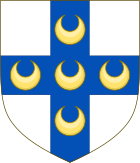The House of Piccolomini (pronounced [pikkoˈlɔːmini]) is the name of an Italian noble family, Patricians of Siena, who were prominent from the beginning of the 13th century until the 18th century.[3] The family achieved the recognized titles of Pope of the Catholic Church, Prince of the Holy Roman Empire, Grandee of Spain, and Duke of Amalfi. The family is also featured in Florentine Histories, a book written by Niccolò Machiavelli, where he describes the reign of Pope Pius II, who had allied himself with the Venetians and Prince Vlad Dracula, to wage a war against the Sultan of the Ottoman empire.[4]
- ^ Vittorio Spreti - Enciclopedia Storico Nobiliare Italiana 1928–1936 (Ristampa Anastatica Forni Editore Bologna -1981) Vol. V, pag. 325.
- ^ Anderson, James (1732). "Royal Genealogies: Or, the Genealogical Tables of Emperors, Kings, and Princes, from Adam to These Times". Retrieved 2022-10-26.
- ^ Chisholm 1911, p. 580.
- ^ Penny cyclopaedia, Vol. 18, citing Niccolò Machiavelli. (1532). Historie fiorentine (History of Florence and of the affairs of Italy: from the earliest times to the death of Lorenzo the Magnificent).
